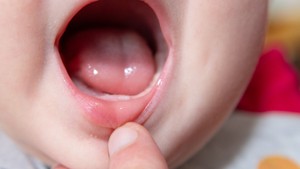Blog
The emergence of your baby’s first tooth is an exciting milestone, but it can also bring some uncertainty for parents.
The emergence of your baby’s first tooth is an exciting milestone, but it can also bring some uncertainty for parents. Understanding what to expect and how to care for your baby’s new teeth is crucial for their comfort and health. This guide covers everything from the timing of that baby’s first tooth and recognizing teething symptoms to remedies for teething pain and best practices for oral care. We’ll also discuss the importance of the first dental visit and the role of nutrition in maintaining healthy baby teeth. With the right information, you can navigate this journey with confidence.
When Do Babies Get Their First Tooth?
The arrival of your baby’s first tooth usually occurs between 6 to 12 months of age, although some babies may start teething as early as 4 months or as late as a year old. Every baby is unique, and factors such as genetics and overall health can influence the age of first tooth appearing. Watching for signs like increased drooling, a tendency to chew on objects, and occasional fussiness can help you anticipate when the primary teeth eruption will occur.
As a parent, keeping track of your child’s growth and development can provide insights into their teething timeline. Early dental care is important, and expert advice on teething and maintaining healthy habits from the start can be invaluable.
Recognizing Teething Symptoms
Recognizing teething symptoms can help you provide the necessary comfort for your baby. Common signs include increased irritability, excessive drooling, and a desire to chew on objects. Your baby may also become fussy or cranky, especially when their primary teeth eruption is about to happen.
It’s important to differentiate teething from other discomforts like ear infections or colds. Teething usually occurs between six months and three years of age, and symptoms are typically localized around the mouth. If your baby has a fever over 101°F, persistent crying, or other unusual symptoms, consult your pediatrician to rule out other health issues.
Behavioral changes like disrupted sleep patterns or increased clinginess can also indicate teething. Some babies may bite more while nursing or feeding. Recognizing these signs allows you to provide soothing remedies such as teething rings or gentle gum massages. By understanding these symptoms, you can better support your child through this natural but often uncomfortable phase.
Effective Remedies for Teething Pain
Teething can be challenging for both babies and parents, but there are effective remedies to soothe sore gums. Offering cold items like chilled teething rings or a damp washcloth placed in the refrigerator can provide relief, as the cold helps numb the gums. Gently massaging the gums with a clean finger can also ease discomfort.
When considering remedies, weigh home options against over-the-counter products. Natural remedies like chamomile tea or diluted clove oil can be effective, but over-the-counter teething gels and medications may also offer immediate relief. Ensure any product you choose is age-appropriate and safe for infants, and consult your pediatrician if you’re unsure.
While teething is a natural process, consult a pediatrician if your baby shows excessive irritability, high fever, or if teething pain seems unmanageable. Your pediatrician can provide guidance tailored to your child’s needs and determine if additional treatment is required. Stay informed and attentive to your baby’s symptoms to navigate this phase successfully.
Oral Care for Your Baby’s First Tooth
Oral care should begin even before your baby’s first tooth appears. Gently wiping your baby’s gums with a soft, damp cloth after feedings helps remove bacteria and establishes a healthy environment for emerging teeth. This early attention to oral hygiene is crucial for preventing cavities and promoting overall dental health.
Once the first tooth appears, introduce fluoride toothpaste. The American Dental Association recommends using a smear of fluoride toothpaste, about the size of a grain of rice, for babies under three years old. Fluoride helps strengthen tooth enamel and protect against decay. Always supervise brushing to ensure your baby doesn’t swallow the toothpaste.
Establishing a daily oral hygiene routine is essential for lifelong dental health. Brush your baby’s teeth twice a day—once in the morning and once before bed. Make brushing fun by using a soft-bristled toothbrush designed for infants and singing a catchy song or using a timer. Involve your child in the process as they grow, allowing them to choose their toothbrush and toothpaste to foster a sense of ownership and excitement about their oral care.
When to Schedule Your Baby’s First Dental Visit
Scheduling your baby’s first dental visit by their first birthday or within six months after the first tooth erupts is crucial for establishing good oral health. This early visit allows your dentist to monitor your child’s dental development and provide advice on proper oral hygiene practices.
During this initial visit, the dentist will perform a gentle examination of your baby’s teeth and gums, checking for signs of decay or abnormalities. They may also offer advice on cleaning your baby’s teeth and the importance of fluoride. This visit is an opportunity for parents to ask questions and gain insights into caring for their child’s dental health.
Early dental visits help prevent cavities and other dental issues. They also help your child become accustomed to the dental office environment, reducing anxiety for future visits. Dental professionals can guide you on nutrition and habits that promote healthy teeth, laying the groundwork for a lifetime of good oral hygiene.
Nutrition and Baby Teeth Health
Nutrition plays a crucial role in your baby’s dental health, especially as their first teeth begin to emerge. High sugar intake can lead to cavities, as sugary foods and drinks create an environment where harmful bacteria thrive. Be mindful of the snacks and beverages you offer to protect your baby’s teeth.
Focus on incorporating nutrient-rich foods into your child’s diet. Dairy products like milk and cheese are excellent sources of calcium and vitamin D, which are vital for strong teeth and bones. Crunchy fruits and vegetables like apples and carrots provide essential vitamins and help stimulate gums and promote saliva production, which naturally cleanses the mouth.
Fluoride is another key component in a child’s diet that supports dental health. Fluoride helps strengthen tooth enamel and reduce the risk of cavities. Many communities provide fluoridated water, and fluoride is often included in children’s toothpaste. Monitor fluoride intake to ensure it remains at safe levels, as too much can lead to dental fluorosis. By paying attention to your child’s nutrition and ensuring adequate fluoride intake, you can help set the foundation for a lifetime of healthy smiles.





